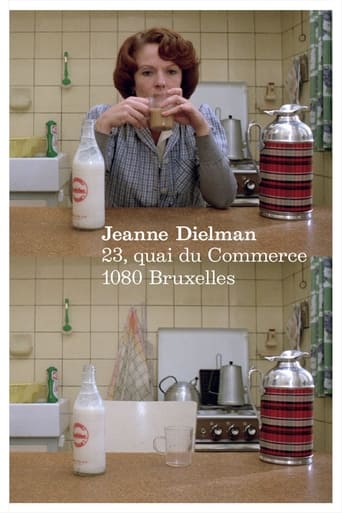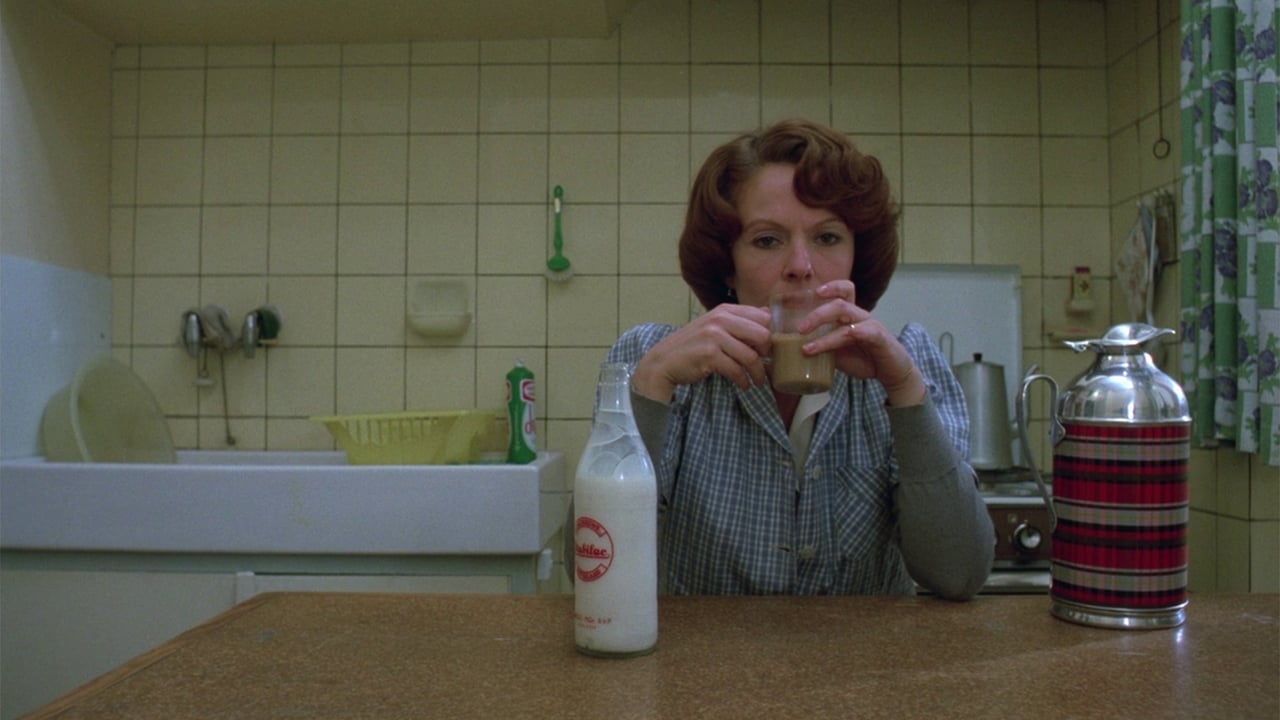Ligeia313-1
I watched this film forty years after it was made, in a theater in downtown New York City that plays only art films. Still, I was impressed by the audience's rapt attention over the 3 and 1/2 hours of the film. I too was sitting fascinated the entire time. We seemed to understand that a part of the experience of watching it was familiarizing ourselves with the details of the dignified Jeanne's existence. Every piece of furniture in her apartment is viewed over and over, and her daily routine is so minutely reviewed that it is imprinted in the mind; so, any tiny deviation jumps out as a sinister departure portending -- what? You wait worriedly to find out what it could mean. Mostly you feel a great sadness for someone who is clearly desperate to make ends meet financially, so she and her child will be okay. You see a perfectionist at work as she proceeds through the day, as though the great care she is taking shining and folding and washing will somehow result in safety for her and the child. There is a spirituality in this, and it begins to take hold of you, and you fervently hope for her survival.
homerjethro
Really, really wanted a slice of meatloaf while watching this. Just a few observations from someone with a huge Criterion library who enjoys "artsy" films:(1) This film might have appeal to students who want to see the results of static scenes. Or it might impress those who need to actually see boring routines play out to get the point (the pocketbook on the table gets my vote for best actor). Or it might be an opportunity for people to yell advice at the screen ("Sit down while polishing shoes!" "You're kneading the meatloaf wrong!" "Turn on the radio while you're working!"). Otherwise...meh.(2) For those who insist that the length is appropriate, I haven't noticed anyone saying that the film would be better at six hours. If she really wanted to make a point, why not film six days? Heck, who knows what exciting things she does the rest of the week...perhaps Ackerman just chose the three days when little happens other than routine (seemingly embraced by the protagonist with little effort to perk up her existence. Maybe she's enjoying herself, or maybe she has an active imagination that allows her to entertain herself).(3) Drying paint on walls has no choice in its banal existence. Humans do have choices. Anyone who doesn't understand that or doesn't know people who don't exercise their choices & live in ruts needs to volunteer to work with the public. Then Ackerman's film won't seem so much like a "masterpiece."(4) If this film is "brave" (whatever that is supposed to mean), here's an exercise in artistic courage: Take a blank sheet of paper to your local art gallery and insist that they display it (perhaps with a huge price tag) to demonstrate your minimalist talent. If they are the pretentious sort and comply, you'll be sure to be lauded by the same sort of snobbish viewers who love to chide others for calling out pretension.
Steve Pulaski
Jeanne Dielman, 23, Quai du Commerce, 1080 Bruxelles defines a bleak, nearly-insufferable reality for some people, but it's a reality undoubtedly face every day - divorced or widowed mothers that must slog away at an endless bout of chores. Their persistency and compulsiveness may not be as meticulous as our titular character's, but they very well could mirror the same mannerisms and patterns in terms of carrying out these chores.For two-hundred and twenty-one minutes, we watch Jeanne Dielman (Delphine Seyrig) carry out a several day's worth of chores, whether it be mopping, washing dishes, peeling potatoes, cooking dinner, and so forth. I'd be interested in hearing the diversity of people's reactions to this material. No doubt some will cringe at the thought of sitting in front of a screen for three and a half hours, viewing a film about a single mom's daily routine. Personally, he premise had be at its naturalism.To faithful readers, it comes as no surprise I'd love Jeanne Dielman; it is one of the most naturalistic, soothing, and original films I've come across in a blue moon. We are simply observers, flies on the wall to Jeanne's daily routine, never interfering or side-stepping our role as a passive observer to her actions. It's hard not to be somewhat vocal at her actions, as we slowly see her dark side come through as she frequently prostitutes herself for money, turning tricks in a shockingly cold way.Not long after the film begins, Jeanne's compulsive routine becomes implanted in our heads, so much so that the sounds of potatoes being peeled, dishes clanking together and being washed, the faucet running, or Jeanne's footsteps on her titled-kitchen floor begin to possess a wonderful and rare musicality to them. We begin to anticipate them, look forward to them, and just sit back and listen to them, as if we're beginning to fall to the life of a routine housewife.The second day in the life of Dielman is when things begin to heat up, however; this is where we see her begin to get tired, frustrated, and sloppy. She winds up overcooking a meal, dropping a newly-cleaned dish, losing a button for a shirt and not being able to find it, among other small, easy-to-miss occurrences. With this, we see Jeanne's only vice is prostitution because it allows for a break in conventionality and a bout of unpredictability, regardless of how cold and vapid the sex so often is. Watching her put up with a thankless, rigorous routine for so long makes one wonder why more mothers aren't participating in a quietly rebellious lifestyle. For all I know, many are.Jeanne Dielman possesses some beautifully natural cinematography and tight-framing techniques, thanks to the work of Babette Mangolte's use of familiar settings as well as directress Chantal Akerman's direction that captures anything and everything in a scene. Akerman scholar Ivone Margulies claims that through her detailed expressions of scenes, depictions of routine monotony, and tightly-compacted shots, Akerman was trying to bring about ideas of feminism, a woman's role in the world at the time, as well as a bout of "anti-illusionism" to the screen, contrary to what cinema was founded on. Early cinema came about by defying reality, convention, and anything real, often inviting a magical persona in with the early shorts of the late-1800's. There's nothing magical about Jeanne Dielman - it's all real, too real.Frankly, some will still not look into Jeanne Dielman because of their lack of desire to see real-life portrayed on film. As someone who hungers for naturalism, believable events, and relatable relationships and characters in films, I find this notion hard to penetrate but can simply respect it. I've had people tell me the films of Joe Swanberg, the Duplass brothers, and Kevin Smith offput them because they're "too real" and "I don't want to see that." I feel people have been quietly, unintentionally thought that going to the movies means seeing something you couldn't see anywhere else, and that films portraying or trying to replicate real life are just not acceptable. Along comes an unassuming but powerful film like Jeanne Dielman that will be missed by people who have the same sort of petty quibbles about naturalistic film.Finally, sex is a recurring theme in the film, although it is never shown in grave detail. Consider the scene where Jeanne's only son brings up the ideas that circumvented his mind when he first discovered what mom and dad were doing in the bedroom, and the anger, hostility, and fear he felt inside of him. They were emotions too big for him to handle, and if he knew his mother was a frequent prostitute, no doubt he'd feel the same sickness. One constant theme and idea in Jeanne Dielman is the characters often say what they're really not supposed to say, leaving no filter on their thoughts. This provides for an unsurprising detailed and open account of feelings, rather than the obligatory situational comedy one would think would arise from such a feature.Jeanne Dielman, 23, Quai du Commerce, 1080 Bruxelles's runtime will no doubt be a slog for many people; this could easily be described a "maddening masterpiece," meaning that while someone can see what is trying to be done and admire the themes, have a hard time sitting through the film. To say Jeanne Dielman was an easy sit for myself would be straight-up lying. However, with each passing scene, the film found a different way to enchant and mesmerize me, regardless of inducing restlessness because of its detailed, real-time look into life.Starring: Delphine Seyrig.
tuzlak007
After watching a house-wife three hours and twenty-one minutes, mostly without seeing anyone else on the screen, going through her daily routine three consecutive days, it is very easy to say "What a monotonous, tedious, unexciting, and boring film." Also, I should add, during the stages of this most interesting story-telling, the camera never moves. Whatever she might be doing in her small, claustrophobic apartment, we observe Jeanne Dielman (played by exquisitely by Delphine Seyrig) through the fixed eye of the camera. Oh, one more thing: There are hardly any spoken words. And, the film has no music either; we hear only the murmur of the traffic outside.Yet, a twenty-five-year-old, extremely talented Chantal Akerman, within the frame of this very unusual structure, managed to direct an exceptional film, a film that should be part of every movie collection.This movie can be seen as a psycho-drama or as a psychoanalytical (i.e. Freudian) study of a lonely woman who has been living with her teen-age son six years after her husband passed away. Whatever the reason(s) --or motive-- of a viewer could be, this film is a gem. A remarkable work-of-art!


 AD
AD






